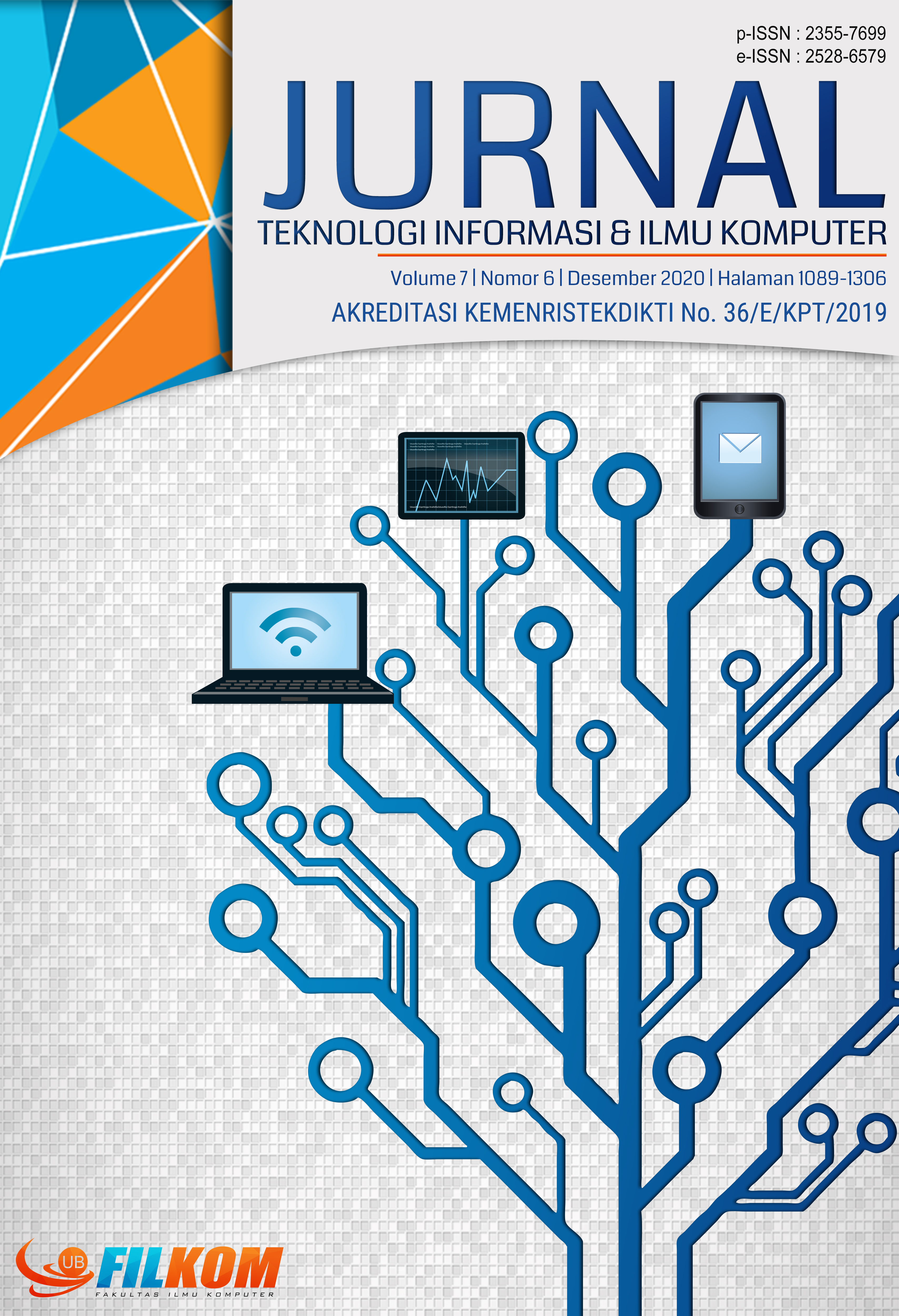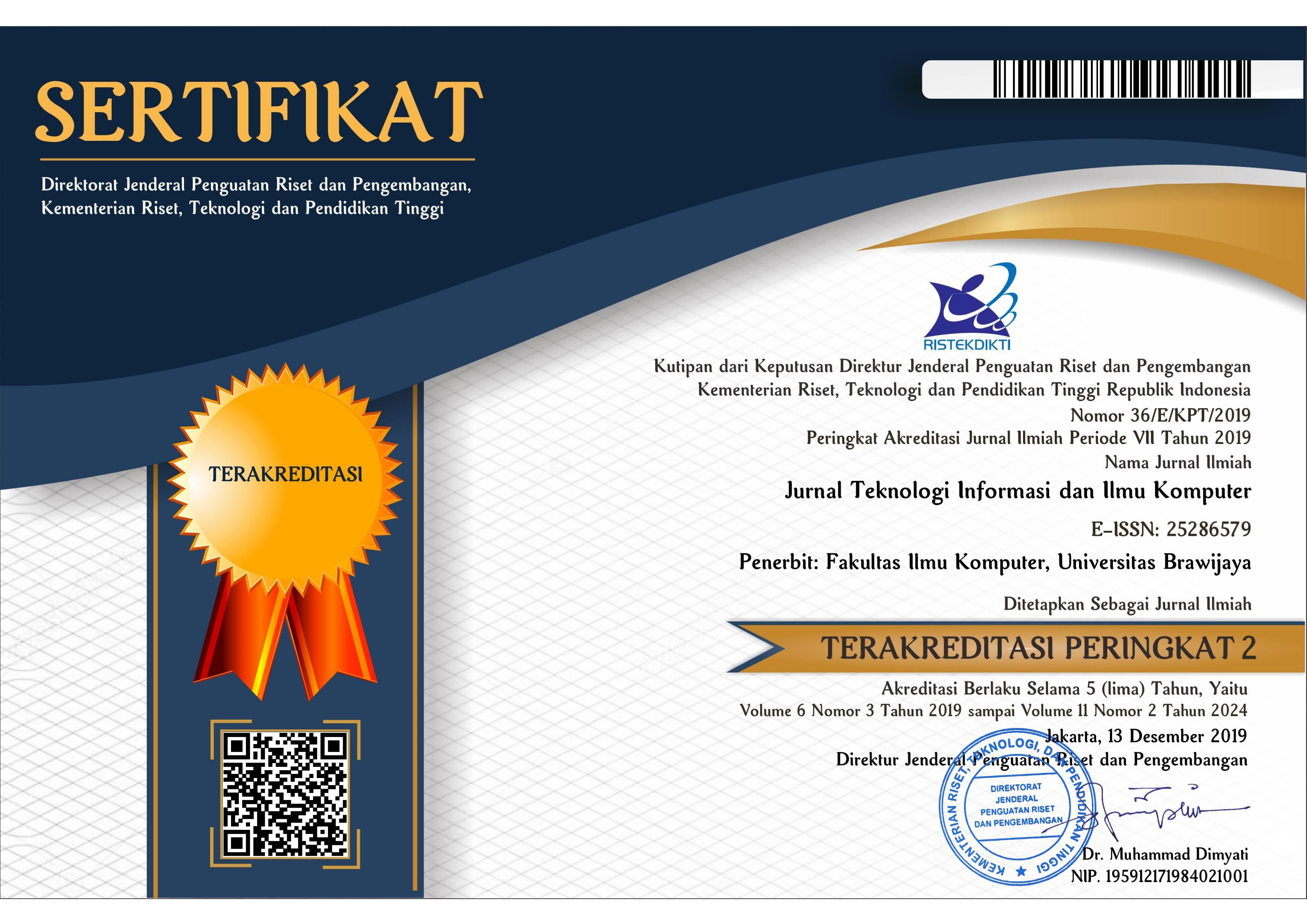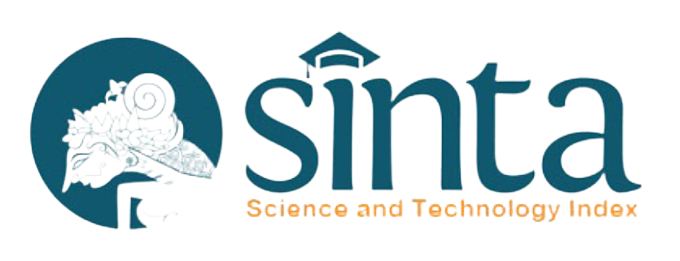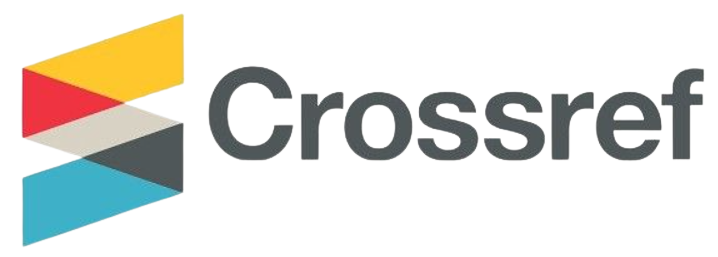Prediksi Tingkat Indeks Prestasi Kumulatif Akademik Mahasiswa dengan Menggunakan Teknik Data Mining
DOI:
https://doi.org/10.25126/jtiik.2020722493Abstrak
Educational data mining (EDM) adalah suatu bidang aplikasi antara pendidikan dan komputer. Salah satu yang dapat dilakukan pada EDM adalah memprediksi tingkat prestasi mahasiswa. Tingkat indeks prestasi kumulatif (IPK) akademik mahasiswa sangat penting karena menentukan tingkat kelulusan dan kualiatas institusi pendidikan. Penelitian ini bertujuan untuk menganalisa atribut-atribut yang mempengaruhi tingkat indeks prestasi kumulatif (IPK) mahasiswa yang berasal dari faktor eksternal pada mahasiswa. Adapun atribut yang digunakan adalah 10 variabel atribut yaitu nilai TOEFL, pendidikan ayah, pendidikan ibu, pekerjaan ayah, pekerjaan ibu, asal daerah, tempat tinggal selama kuliah dan tingkat prestasi akademik yang dicapai. Hasil akurasi pengolahan dengan menggunakan Algoritma C4.5 adalah 75,18% dan Naive Bayes 74,47% menunjukkan bahwa model dan atribut yang digunakan baik untuk memprediksi tingkat IPK mahasiswa. Algoritma C4.5 mampu menunjukkan atribut apa yang berpengaruh langsung pada tingkat IPK mahasiswa yaitu Nilai TOEFL, jam belajar, pendidikan ayah, pekerjaan ayah, dan tempat tinggal mahasiswa. Algoritma C4.5 tidak mampu memperhitungkan peluang suatu klasifikasi jika jumlah instan pada klasifikasi tersebut sangat sedikit pada kejadian data. Sebaliknya Naive Bayes tetap mampu memperhitungkan peluang kemunculan dan ketepatannya informasi yang dihasilkan meski jumlah instan yang sedikit. Dalam penelitian ini data mahasiswa yang memiliki tingkat IPK cumlaude sangat sedikit, namun Naive Bayes tetap mampu mengukur Recall pada kelas ini sebesar 28,6% dan Precision sebesar 40%.
Downloads
Referensi
ALTUJJAR, Y., ALTAMIMI, W., AL-TURAIKI, I. & Al-RAZGAN, M. 2016. Predicting Critical Courses Affecting Students Performance : A Case Study. Procedia-Procedia Computer Science. 82, no. March, pp. 65–71.
ANJEWIERDEN, A. & KOLL, B. 2007. Towards Educational Data Mining : Using Data Mining Methods for Automated Chat Analysis to Understand and Support Inquiry Learning Processes. Proceedings of the International Workshop on Applying Data Mining in e-Learning, Greece.
BERGER, J.O. 2013. Statistical Decision Theory and Bayesian Analysis, 2013th edn, Springer-Verlag.
BREIMAN, L., FRIEDMAN, J. H., OLSHEN, R. A., & STONE, C.J. 1984. Classification and Regression Trees. Wadsworth International Group, Belmont, CA.
BURGOS, C., CAMPANARIO, M.L., DE, D., LARA, J.A., LIZCANO, D. & MARTÍNEZ, M.A. 2017. Action Plan to Prevent Academic Dropout R. Computers & Electrical Engineering, 66, pp. 1–16.
CHALARIS, M., GRITZALIS, S., MARAGOUDAKIS, M. & SGOUROPOULOU, C. 2014. Improving Quality of Educational Processes Providing New Knowledge Using Data Mining Techniques. Procedia - Social and Behavioral Sciences. 147, pp. 390–7.
CHARTERIS, J., QUINN, F., PARKES, M., FLETCHER, P. & REYES, V. 2016. E-Assessment for Learning and Performativity in Higher education : A Case for Existential Learning. Australasian Journal of Educational Technology, 32, no. 3, pp. 112–22.
DAUD, A. 2017. Predicting Student Performance using Advanced Learning Analytics. International World Wide Web Conference Committee (IW3C2). Creative Commons CC, Perth, Australia, pp. 415–21.
GOBERT, J.D., JEON, Y., SAO, M.A., KENNEDY, M. & BETTS, C.G. 2015. Systems Microworld. Thinking Skills and Creativity. 18, pp. 81–90.
GOLDING, P., & DONALDSON, O. 2006. Predicting Academic Performance. Frontiers in Education Conference, 36th.
HAMSA, H., J.KIZHAKKETHOTTAM, J. & INDIRADEVI, S. 2016. Student Academic Performance Prediction Model Using Decision Tree and Fuzzy Genetic Algorithm. Procedia Technology. 25, pp. 326–32.
KATSIKAS, E. & PANAGIOTIDIS, T. 2010, Student Status and Academic Performance : an approach of the quality determinants of university studies in Greece, Greece.
KOTSIANTIS, S.B. 2012. Use of Machine Learning Techniques for Educational Proposes: A Decision Support System for Forecasting Students Grades. Artificial Intelligence Review, 4, no. 3, pp. 331–44.
LÓPEZ, C.E., GUZMÁN, E.L. & GONZÁLEZ, F.A. 2015. A Model to Predict Low Academic Performance at a Specific Enrollment Using Data Mining. IEEE Revista Iberoamericana de Tecnologias del Aprendizaje. 10, no. 3, pp. 119–25.
MAYILVAGANAN, M. & KALPANADEVI, D. 2015. Cognitive Skill Analysis for Students through Problem Solving Based on Data Mining Techniques. Procedia-Procedia Computer Science, 47, pp. 62–75.
MOHAMED, A., RIZANER, A. & HAKAN, A. 2016. Using data Mining to Predict Instructor Performance. Procedia - Procedia Computer Science. 102, no. August, pp. 137–42.
NORWAWI, N. M., ABDUSALAM, S. F., HIBADULLAH, C. F., & SHUAIBU, B.M. 2009. Classification of students’ performance in computer programming course according to learning style. The Data Mining and Optimization (DMO), 2nd Conference.
OGUNDE A, O. & AJIBADE D, A. 2014. A Data Mining System for Predicting University Students Graduation Grades Using ID3 Decision Tree Algorithm. Journal of Computer Science and Information Technology. 2. no. 1, pp. 21–46.
PENAAYALA, A. 2014. Expert Systems with Applications Educational data mining : A Survey and a Data Mining-Based Analysis of Recent Works. Expert Systems with Applications. 41, no. September, pp. 1432–62.
ROMERO, C., LÓPEZ, M., LUNA, J. & VENTURA, S. 2013. Computers & Education Predicting Students’ Final Performance from Participation in On-line Discussion Forums. Computers & Education. 68, pp. 458–72.
ROMERO, C & VENTURA, S. 2007. Educational Data Mining” : A Survey from 1995-2005. Expert System with Application. 3, no. 335–346.
SALAZAR, A., GOSALBEZ, J., BOSCH, I., MIRALLES, R. & VERGARA, L. 2004. A case study of knowledge discovery on academic achievement, student desertion and student retention UITRE 2004. Information Technology: Research and Education, Landon, pp. 150–4.
SHANA, J., & VENKATACHALAM, T. 2011. Identifying Key Performance Indicators and Predicting the Result from Student Data. International Journal of Computer Applications. 25, no. 9, pp. 0975 – 8887.
TUCKER, C. & PURSEL, B.K. 2014. Mining Student-Generated Textual Data In MOOCS And Quantifying Their Effects on Student Performance and Learning Outcomes Mining Student-Generated Textual Data in MOOCS and Quantifying Their Effects on Student Performance and Learning Outcomes. 121st ASEE Annual Conference & Exposition.
VALLS, F., REDONDO, E., FONSECA, D., TORRES-KOMPEN, R., VILLAGRASA, S. & MARTÍ, N. 2017. Urban Data and Urban Design : A Data Mining Approach to Architecture Education. Telematics and Informatics, Elsevier Ltd.
VLAHOS, G.E., FERRATT, T.W. & KNOEPFLE, G. 2004. The Use of Computer-Based Information Systems by German Managers to Support Decision Making. Journal Information and Management. 41, pp. 763–79.
WANLI, X., RUI, G., EVA, P. & SEAN, G. 2015. Computers in Human Behavior Participation-Based Student Final Performance Prediction Model Through Interpretable Genetic Programming : Integrating learning analytics, Educational Data Mining and Theory. Computer in Human Behavior. 47, pp. 168–81.
WASSAN, J.T. 2015. Discovering Big Data Modelling for Educational World. Procedia - Social and Behavioral Sciences. 176, pp. 642–9.
YAHDIN, S., DESIANI, A., AMRAN, A. & RODIAH, D. 2019. Pattern recognition for study period of student in Mathematics Department with C4. 5 algorithm data mining technique at the Faculty of Mathematics and Natural Science Universitas Sriwijaya Pattern recognition for study period of student in Mathematics Department. Sriwijaya International Conference on Basic and Applied Science, pp. 1–6.
ZHANG, L., JIANG, L., LI, C. & KONG, G. 2016. Two Feature Weighting Approaches for Naive Bayes Text ClassiÞers. Knowledge-Based Systems. 100, pp. 137–44.
Unduhan
Diterbitkan
Terbitan
Bagian
Lisensi

Artikel ini berlisensi Creative Common Attribution-ShareAlike 4.0 International (CC BY-SA 4.0)
Penulis yang menerbitkan di jurnal ini menyetujui ketentuan berikut:
- Penulis menyimpan hak cipta dan memberikan jurnal hak penerbitan pertama naskah secara simultan dengan lisensi di bawah Creative Common Attribution-ShareAlike 4.0 International (CC BY-SA 4.0) yang mengizinkan orang lain untuk berbagi pekerjaan dengan sebuah pernyataan kepenulisan pekerjaan dan penerbitan awal di jurnal ini.
- Penulis bisa memasukkan ke dalam penyusunan kontraktual tambahan terpisah untuk distribusi non ekslusif versi kaya terbitan jurnal (contoh: mempostingnya ke repositori institusional atau menerbitkannya dalam sebuah buku), dengan pengakuan penerbitan awalnya di jurnal ini.
- Penulis diizinkan dan didorong untuk mem-posting karya mereka online (contoh: di repositori institusional atau di website mereka) sebelum dan selama proses penyerahan, karena dapat mengarahkan ke pertukaran produktif, seperti halnya sitiran yang lebih awal dan lebih hebat dari karya yang diterbitkan. (Lihat Efek Akses Terbuka).












